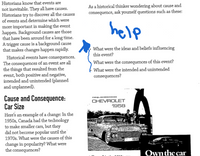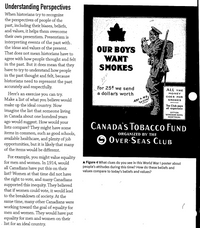Question
urgently can you help me with three questions

Transcribed Image Text:Historians know that events are
not inevitable. They all have causes.
Historians try to discover all the causes
of events and determine which were
As a historical thinker wondering about cause and
consequence, ask yourself questions such as these:
more important in making the event
happen. Background causes are those
that have been around for a long time.
A trigger cause is a background cause
that makes changes happen rapidly.
help
What were the ideas and beliefs influencing
this event?
Historical events have consequences.
The consequences of an event are all
the things that resulted from the
event, both positive and negative,
intended and unintended (planned
and unplanned).
What were the consequences of this event?
& What were the intended and unintended
consequences?
Cause and Consequence:
Car Size
Here's an example of a change: In the
1950s, Canada had the technology
to make smaller cars, but they
did not become popular until the
1970s. What were the causes of this
change in popularity? What were
the consequences?
CHEVROLET
1958
Ownthe car

Transcribed Image Text:Understanding Perspectives
When historians try to recognize
the perspectives of people of the
past, including their blases, beliefs,
and values, it helps them overcome
their own presentism. Presentism is
interpreting events of the past with.
the ideas and values of the present.
That does not mean historians have to
agree with how people thought and felt
in the past. But it does mean that they
have to try to understand how people
in the past thought and felt, because
historians need to represent the past
accurately and respectfully.
OUR BOYS
WANT
SMOKES
For 25t we send
a dollars worth
ALL THE
Here's an exercise you can try.
Make a list of what you believe would
make up the ideal country. Now
imagine the list that someone living
in Canada about one hundred years
ago would suggest. How would your
lists compare? They might have some
items in common, such as good schools,
available healthcare, and plenty of job
opportunities, but it is likely that many
of the items would be different.
For example, you might value equality
for men and women. In 1914, would
all Canadians have put this on their
list? Women at that time did not have
the right to vote, and many Canadians
supported this inequity. They believed
that if women could vote, it would lead
to the breakdown of society. At the
same time, many other Canadians were
working toward the goal of equality for
men and women. They would have put
equality for men and women on their
list for an ideal country.
MONEY
GOES FOR
ARFANO.
SMOKES
The Club paya
all pensea
orrien
MOHTREAL
CANADA's TobaccCo FUND
O OVER-SEAS CLUB
ORGANIZED BY THE
A Figure 4 What clues do you see in this World War ! poster about
people's attitudes during this time? Haw do these baliefs and
values compare to today's beliefs and values?
Expert Solution
This question has been solved!
Explore an expertly crafted, step-by-step solution for a thorough understanding of key concepts.
This is a popular solution
Trending nowThis is a popular solution!
Step by stepSolved in 2 steps
